
Related
Guests
- Jawanza Karriem Colvinpastor of Olivet Institutional Baptist Church in Cleveland, Ohio.
The Republican National Convention is underway just a few miles from the park where 12-year-old Tamir Rice was shot dead by police in November of 2014 while he was playing with a toy pellet gun. We speak with Rev. Dr. Jawanza Karriem Colvin, the pastor of the Olivet Institutional Baptist Church, which is one of the largest African-American congregations in Cleveland, about how city officials and activists responded to the killing. He was recently profiled in a Politico report titled “The Preacher Who Took on the Police.”
Transcript
AMY GOODMAN: We’re joined right now by Reverend Dr. Jawanza Karriem Colvin, the pastor of the Olivet Institutional Baptist Church, which is one of the largest African-American congregations in Cleveland. He was recently profiled in Politico in a piece titled “The Preacher Who Took on the Police.”
Reverend Colvin, welcome to Democracy Now!
REV. JAWANZA KARRIEM COLVIN: Glad to be here.
AMY GOODMAN: Took on the police how?
REV. JAWANZA KARRIEM COLVIN: Well, when the incident took place with respect to the fatal shooting of Tamir Rice, I and others within the activist community made a decision that we couldn’t allow the death of this young boy to go without justice. I reached out to the Department of Justice. I began to reach out to my brothers and sisters in the activist community, many not in the church, but within a community of conscience built around academics, people in the nonprofit community. And we began to work together to figure out a way in which we could bring this issue to light. The family had done a great job in bringing national civil rights attorneys to their assistance. But we thought that if they did not have community support and they didn’t have community activism to continue to bring this, not only for individual justice for their son, but to make sure that there was attention brought to the injustice related to the entire Cleveland Police Department.
AMY GOODMAN: Can you explain something to me? We went to Cudell Park, to the recreational center, where young Tamir, 12 years old—it was what? November 22nd—
REV. JAWANZA KARRIEM COLVIN: Yeah.
AMY GOODMAN: —2014, has a toy gun, police move in within a few seconds, Officer Loehmann shoots Tamir Rice dead. Now, we’re here at the convention. There have been protests around the issue of assault weapons. You have open carry in this state, so people carry guns all the time. Even if they thought he had a gun, within seconds shooting him? And it’s been shown by studies that white police officers think kids, black kids, are older like by 10 years than they are. So here they’re seeing—they thought he was like 20, and he’s got a gun. You’re allowed to carry a gun in this state.
REV. JAWANZA KARRIEM COLVIN: Except if you’re an African-American male, particularly if you’re an African-American male that’s in a community that is perceived as hostile, if you’re in a community in which young people are oftentimes viewed as much older than they particularly are. The challenge is that there were a number of forces that were working against Tamir that day. Being a young black male with historical challenges between police and community, Tamir found himself in a place and a position where, when Loehmann, who we know had a history of instability with respect to his unfitness to being in another department, but when he came to the city of Cleveland, he was allowed to not only have a badge but also allowed to carry a gun, and when Tamir found himself in the crosshairs, in less than two seconds, this young boy, who was playing with his toy gun, was only doing something that any young 12-year-old would do in a community center, place that he went to every day, obviously found himself in a circumstance and a situation which, unfortunately, was not in the best judgment of those police officers.
AMY GOODMAN: Neither of these officers, the one who shot him, Loehmann, who, what, was described as having low gun impulse control at the previous department he worked in Independence—
REV. JAWANZA KARRIEM COLVIN: That’s right.
AMY GOODMAN: —and Garmback, who had another excessive force case around him, where they had—the police department had to pay out, I think, a six-figure amount, have been indicted. What about the federal investigation?
REV. JAWANZA KARRIEM COLVIN: Well, the federal investigation, at this point, we know that, in terms of civil rights, the civil rights bar is so high that oftentimes we can’t—we don’t see any federal action taking place. I mean, that’s why that I and seven of my colleagues went into municipal court, looking at the Ohio Revised Code and finding there was a statute that if citizens can come and find an affidavit—and file an affidavit stating that there is evidence, reason to believe, that a crime has been committed, you can do that. We did that. That video indicated that there was probable cause. And the fact that while a municipal court judge, an African-American municipal court judge in a majority African-American city, found there was reasonable—I mean, at least probable cause, which is a low bar. Ironically, when it went to the county, County Prosecutor Tim McGinty found that there was not enough evidence to even to have an indictment, which, in and of itself, is problematic. We’ve seen the GQ.com article, which indicates that it was a sham from the beginning, that it was an orchestrated attempt, really, to try this case in secret, which I only thought we did in Eastern Bloc countries 50 years ago.
AMY GOODMAN: McGinty ultimately losing his race again for prosecutor.
REV. JAWANZA KARRIEM COLVIN: He did lose his race, but, unfortunately, justice still has not been served. And so, while justice was meted out for Mr. McGinty, unfortunately we still have—we still have a case, and there is no statute of limitations on murder. And so, you know, it is up to the family whether they want to continue to pursue that, because many of us in the activist community are supporting the family in such a case. But what we do know is from both the law enforcement community to the Prosecutor’s Office, there was clearly injustice that was done. And it is not simply to be found in Loehmann. It is systemic, it is institutional, and I’m not sure that changing one prosecutor is really going to change the process.
AMY GOODMAN: I want to go to the Republican National Convention. On Monday night, the Milwaukee County sheriff, David Clarke, celebrated the acquittal of the Baltimore police officer Brian Rice, one of the officers on trial in the Freddie Gray case. Gray died from injuries sustained in police custody. We were on the floor when Sheriff Clarke took the stage of the convention.
SHERIFF DAVID CLARKE: There is some good news out of Baltimore, Maryland, as Lieutenant Brian Rice was acquitted on all charges. … What we witnessed in Ferguson and Baltimore and Baton Rouge was a collapse of the social order. So many of the actions of the Occupy movement and Black Lives Matter transcends peaceful protest and violates the code of conduct we rely on. I call it anarchy.
AMY GOODMAN: That is the Milwaukee County sheriff, David Clarke. Your response, Dr. Jawanza Karriem Colvin?
REV. JAWANZA KARRIEM COLVIN: What’s interesting is that what the sheriff is calling anarchy, we call, you know, our First Amendment rights—the right to protest, the right to peaceful assembly. Black Lives Matter has utilized the best of the civil rights tradition: nonviolent direct action. The only thing and the only association that he can connect with the murders of those police officers and Black Lives Matter is the fact that they are, in fact, black. I mean, officers—we talk about the challenge with respect to rebuilding the trust between officers, law enforcement and the community. Historically, there has never been trust between the law enforcement community and African-American community. And this only reinforces the same type of enmity, deeply embedded mistrust, that is clearly not simply on the perspective or the side of the African-American community. But also, this is reflective, clearly, of mistrust on the side of law enforcement.
AMY GOODMAN: The Texas lieutenant governor, Dan Patrick, appeared on CNN here in Cleveland, expressed support for an investigation, following Donald Trump’s statement Monday night on Fox News that, if elected, he would instruct his attorney general to look into Black Lives Matter.
REV. JAWANZA KARRIEM COLVIN: Well, thankfully, he’s lieutenant governor, not president of the United States and not the head of the Department of Justice. You know, it’s amazing that Black Lives Matter, which is a movement which has brought to the fore the issue of, you know, police misconduct, Black Lives Matter, which has finally put on the national platform and in the national conversation the issue of the excessive use of force and the unconstitutionality of the encounters with police and African Americans, are now themselves being criminalized. They are the ones being criminalized. It is an amazing phenomenon that now we have the law enforcement community, and those who support them, saying somehow that the blue shield is more important than citizenship and expressing constitutional rights.
AMY GOODMAN: The number of black delegates, 18, lowest number, believed, in more than half a—in more than a century here at the Republican convention.
REV. JAWANZA KARRIEM COLVIN: And I would add to that, I saw the recent poll, that zero percent support for Donald Trump, and I know that is not within the margin of error. It’s absolutely right. You know, Adam Clayton Powell said decades ago, the reason that black people—most African Americans are not conservative, because they have nothing to conserve. There is nothing in the current state of the American economy, the current state of American social order, the current state of policing in America that African Americans would want to preserve. So I’m not surprised. I’m actually surprised that we have as—the few that we do have, even in light of the fact of the vitriol that we have coming out of Donald Trump.
But I would say this, is that African Americans are not going to be—even on the left, are not going to be intimidated to vote against Donald Trump. We’re not going to be, in any way, shape or form, made to feel that he’s the bogeyman or anything of that nature. The truth is, African Americans, over the course of 400 years, since 1619, have dealt with all kinds of blowhards, whether we’re talking about Bull Connor, Orval Faubus, George Wallace. And so, we know how to deal with the Donald Trumps. So, when we go to the—into the polls, it’s not about who we’re voting against or what we—
AMY GOODMAN: We have five seconds.
REV. JAWANZA KARRIEM COLVIN: —but rather, what we’re voting for.
AMY GOODMAN: I want to thank you so much for being with us, Reverend Dr. Jawanza Karriem Colvin, pastor of the Olivet Institutional Baptist Church here in Cleveland, Ohio.
That does it for our show. I’ll be doing a report back from the conventions after our two weeks of coverage—on Friday, July 29th at the Provincetown Town Hall in Massachusetts, and Saturday, July 30th, on Martha’s Vineyard at Old Whaling Church. Check our website. Follow our team for the latest updates from the convention on Facebook, Twitter, Instagram and Snapchat.

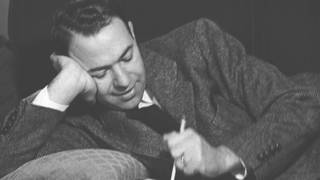
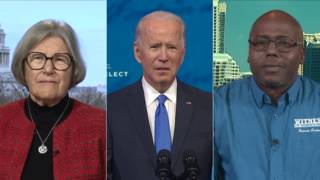
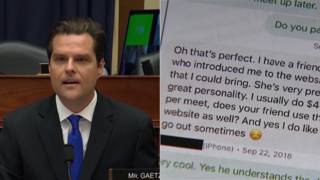
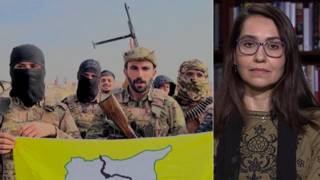





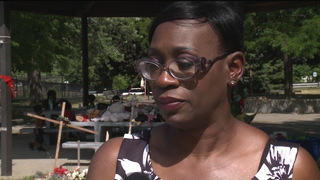

Media Options